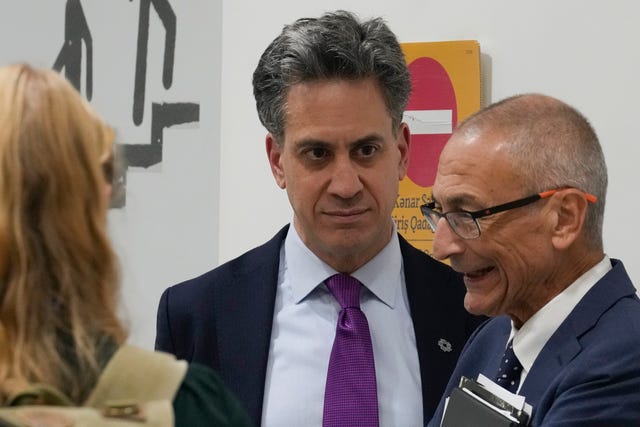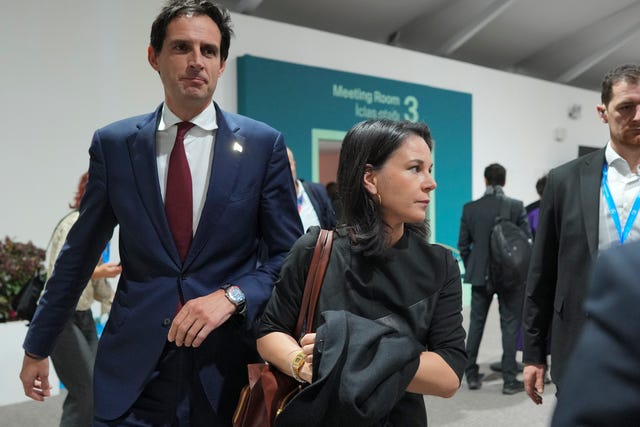
Hopes of a deal on a giant funding package for poor nations to curb and adapt to climate change have emerged as United Nations climate talks continued in Azerbaijan.
A financial package — a compromise between the 1.3 trillion dollars a year developing nations want and the current 100 billion dollar amount — is still being discussed.
It has been shown to small island nations and it appears to be something that Fiji can live with, its delegation chief Biman Prasad told The Associated Press.
He would not reveal the amount but the previous number that small islands had rejected was 250 billion dollars a year.
The presidency of the Cop29 talks said a final draft text on the dollar amounts will be out soon. Mr Prasad said he has been consulted and it will be enough because there are options for it to grow.

“Everybody is committed to having an agreement,” Mr Prasad said. “And we feel that there will be an agreement.”
“They are not necessarily happy about everything, but the bottom line is everybody wants a good agreement,” Mr Prasad said.
But Panama’s Juan Carlos Monterrey called it “unacceptable” in a post on X, saying “the text is detrimental to our future and the qualified goal is still very low”.
Other small island delegates were more circumspect than Mr Prasad.
“Many things are still inconclusive,” Barbados’s Liz Thompson said. “We agreed to ensure there was not a collapse of the meeting.”
Earlier on Saturday, negotiators went from one big room where everyone tried to hash out a deal together into several separate huddles of upset nations.
Hallway talk oscillated between hope for shuttle diplomacy to bridge the gap and kicking the can down the road to some time next year. Negotiators and analysts had mostly given up hope that the host presidency would get the job done.
After an initial proposal of 250 billion dollars a year was soundly rejected on Friday, the Azerbaijan presidency brewed up a new rough draft of 300 billion dollars that was never formally presented but also dismissed by African nations and small island states, according to messages relayed from inside.
Then a group of negotiators from the Least Developed Countries bloc and the Alliance of Small Island States left the room.
Asked if the walkout was a protest, Colombia environment minister Susana Mohamed told The Associated Press: “I would call this dissatisfaction, (we are) highly dissatisfied.”
The last official draft on Friday pledged 250 billion dollars annually by 2035, more than double the previous goal of 100 billion dollars set 15 years ago but far short of the annual one trillion-plus dollars that experts say is needed.
Developing countries have accused the richer nations of trying to get their way – and a small financial aid package – via a war of attrition.
Meanwhile, small island nations, particularly vulnerable to climate change’s worsening effects, accused the host country presidency of ignoring them for the entire two weeks.
Panama chief negotiator Mr Gomez said: “Every minute that passes we are going to just keep getting weaker and weaker and weaker.
“They don’t have that issue. They have massive delegations,” Mr Gomez said, as he watched a delegation of about 20 people from the EU enter the room after shortly after one of his own colleagues left.
“This is what they always do. They break us at the last minute. You know, they push it and push it and push it until our negotiators leave. Until we’re tired, until we’re delusional from not eating, from not sleeping.”

With ministers and delegations from developing nations having to catch flights home, desperation has set in, said Mohamed Adow of Power Shift Africa .
“The risk is if developing countries don’t hold the line, they will likely be forced to compromise and accept a goal that doesn’t add up to get the job done,” he said.
Cedric Schuster, the Samoan chairman of the Alliance of Small Island States issued a statement saying they “were not part of the discussion that gave rise to these imbalanced texts” and asked the Cop29 presidency to listen to them.
Wealthy nations are obligated to help vulnerable countries under an agreement reached at these talks in Paris in 2015.
Developing nations are seeking 1.3 trillion dollars to help adapt to droughts, floods, rising seas and extreme heat, pay for losses and damages caused by extreme weather, and transition their energy systems away from planet-warming fossil fuels and towards clean energy.
Mr Gomez said even the increased 300 billion dollar figure is “still crumbs”.
“How do you go from the request of 1.3 trillion dollars to 300 billion dollars? I mean, is that even half of what we put forth?” he asked.
On Saturday morning, Irish environment minister Eamon Ryan said there will likely be a new number for climate finance in the next draft, adding: “But it’s not just that number – it’s how do you get to 1.3 trillion dollars?”
Mr Ryan said any number reached at the summit will have to be supplemented with other sources of finance, for example through a market for carbon emissions where polluters would pay to offset the carbon they produce.
Teresa Anderson, the global lead on climate justice at Action Aid, said that in order to get a deal, “the presidency has to put something far better on the table”.

“The US in particular, and rich countries, need to do far more to show that they’re willing for real money to come forward,” she said.
“And if they don’t, then LDCs (Least Developed Countries) are unlikely to find that there’s anything here for them.”
Alden Meyer of the climate think tank E3G said it is still up in the air whether a deal on finance will come out of Baku at all.
“It is still not out of the question that there could be an inability to close the gap on the finance issue,” he said. “That obviously is not an ideal scenario.”
Jiwoh Emmanuel Abdulai, the Sierra-Leone environment minister, echoed that sentiment, saying “a bad deal may be worse than no deal for us”.


Why are you making commenting on The National only available to subscribers?
We know there are thousands of National readers who want to debate, argue and go back and forth in the comments section of our stories. We’ve got the most informed readers in Scotland, asking each other the big questions about the future of our country.
Unfortunately, though, these important debates are being spoiled by a vocal minority of trolls who aren’t really interested in the issues, try to derail the conversations, register under fake names, and post vile abuse.
So that’s why we’ve decided to make the ability to comment only available to our paying subscribers. That way, all the trolls who post abuse on our website will have to pay if they want to join the debate – and risk a permanent ban from the account that they subscribe with.
The conversation will go back to what it should be about – people who care passionately about the issues, but disagree constructively on what we should do about them. Let’s get that debate started!
Callum Baird, Editor of The National
Comments: Our rules
We want our comments to be a lively and valuable part of our community - a place where readers can debate and engage with the most important local issues. The ability to comment on our stories is a privilege, not a right, however, and that privilege may be withdrawn if it is abused or misused.
Please report any comments that break our rules.
Read the rules hereLast Updated:
Report this comment Cancel